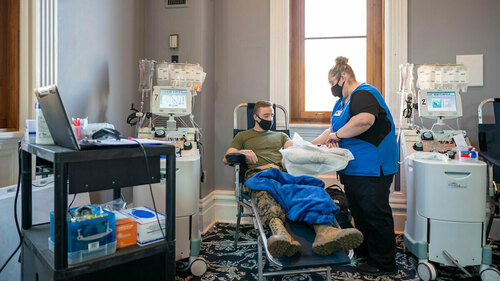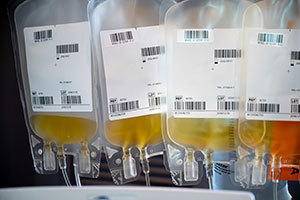
Baumer Hall, in partnership with the South Bend Medical Foundation, hosted “Domers R Donors,” a convalescent plasma drive, Wednesday (Nov. 4) and Thursday (Nov. 5) at the LaFortune Student Center.
University of Notre Dame students who previously tested positive for the coronavirus donated blood during the drive to aid in the treatment of current coronavirus patients in the South Bend-Elkhart area.
Seventeen students participated in the drive, resulting in 56 units of convalescent plasma for area hospitals, which rely on the South Bend Medical Foundation for laboratory, pathology and blood banking services.
Notre Dame tests thousands of students, faculty and staff for the coronavirus daily, totaling more than 66,000 tests since August. More than 1,100 graduate and undergraduate students and more than 80 faculty and staff have tested positive for the virus. Not quite 1,100 have recovered from it.

“People who’ve recovered from COVID-19 have antibodies to the disease in their blood. Medical professionals call this convalescent plasma, and it’s a promising treatment option physicians are using to help severely ill patients recover from the virus,” said Dr. Joyce Simpson, president of the South Bend Medical Foundation. “We’re honored to partner with Notre Dame to help fight against COVID-19.”
Robert Duncheskie, a sophomore from southeast Pennsylvania, organized the drive with student government leaders from Baumer Hall as a way to turn the negative of the virus, which has affected all aspects of campus life, into a positive for Notre Dame and the wider South Bend-Elkhart community.
“Surely, with all these students who now have antibodies to the virus, we can make a positive impact on the community,” Duncheskie said.
At the same time, he said, “Back in May, Notre Dame was one of the first schools to announce the return of in-person instruction for the fall. The entire world was watching, and as the campus struggled with a rise in positive cases early on, we did not back down — we fought harder. Because that’s what we do — we are the Fighting Irish. As Father Jenkins said, ‘Together, we are writing one of the great comebacks in Notre Dame history.’ With this drive, we want to help finish that comeback story.”
Notre Dame students, faculty and staff, along with affiliated organizations, have assisted with the local response to the coronavirus in a variety of ways since March.
The women’s soccer team collected 1,111 pounds of food for the Food Bank of Northern Indiana. The Ladies of Notre Dame and Saint Mary’s College helped to sew 5,000 face masks for local K-12 students. The Center for Civic Innovation coordinated remote assistance for low-income taxpayers. The Innovation Lab designed and fabricated face masks and intubation boxes for local hospitals. Chinese students, faculty and staff coordinated the donation of PPE to local hospitals from China. Notre Dame Research coordinated the donation of PPE to local hospitals from research labs.
At the state level, a Notre Dame-based research coalition launched the Indiana COVID-19 Registry, an online research study that provides real-time information about the spread of the virus and its impact in the state.
For more information about these and other projects, visit news.nd.edu.
Contact: Erin Blasko, assistant director of media relations, 574-631-4127, eblasko@nd.edu